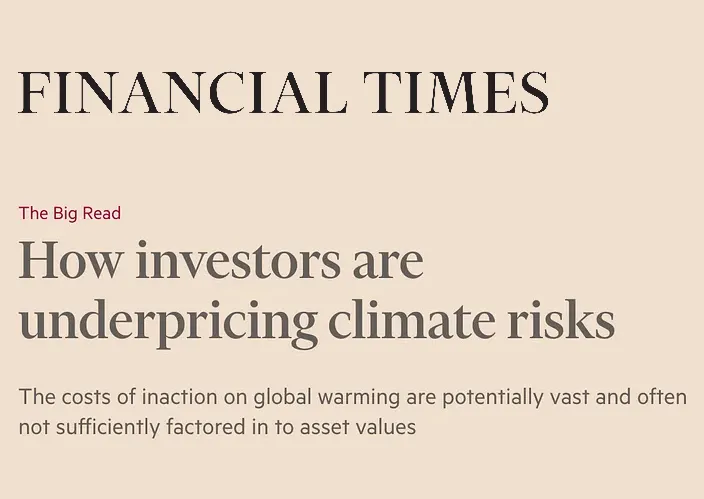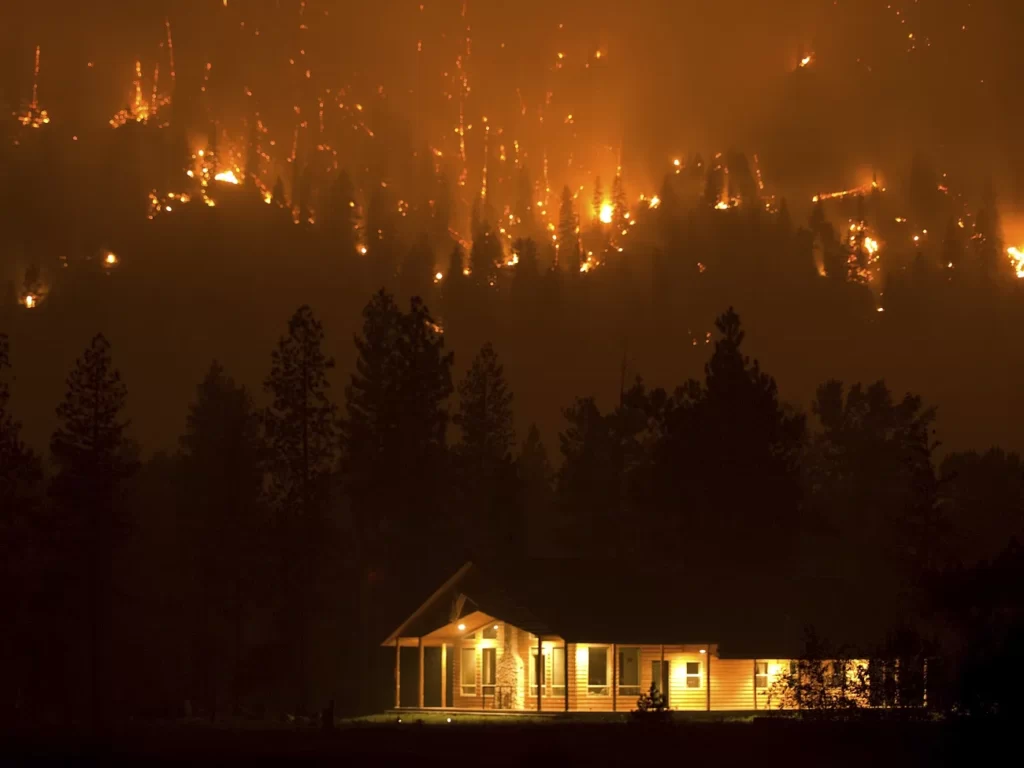And for the cataclysmic gap between theory, policy and ecosystem collapse.
[This article was first published on Ann’s Substack site, System Change, on 21st August 2023]
The Financial Times’s Lex column is legendary.
The editor, Jonathan Guthrie, argues that it is “the oldest and arguably most influential column of its kind” having first appeared in 1945. Lex is written by a collective – there are no author bylines because that would be inaccurate, writes Guthrie. The name is “a riff on the Latin phrase for ‘Law of the Markets’” and the column is for “anyone interested in the story of global capital viewed through the prism of corporate news.”
In other words, Lex is for the very serious people.
So it was with some interest my attention was drawn to the latest ‘Lex in depth article’,¹ titled ‘how investors are underpricing climate risks”– an unusual intervention for this conservative and mainstream column.

The Lex collective, it appears, is uneasy. Not surprising given cascading news reports of global climate upheaval; killer wildfires that destroy whole towns and populations; the record-breaking boreal fires that Scientific American warns may be a climate ‘time-bomb’; warming oceans; melting permafrost; and murderous floods.
Despite these events, Lex columnists are not panicking. Just warning investors against “underpricing climate risks”. They tentatively suggest that asset values may need “recalibrating”. The word “unsustainable” is deployed several times. The future “underperformance” of hypothetical portfolios is discussed. “Climate induced sovereign downgrades could happen as early as 2030” the column warns – ignoring current calamities and leaving plenty of time to adjust a bond portfolio.
“Skilful adaptation” suggests Lex phlegmatically, “would soften the blow from climate change.”
The Lex collective does express concern about the future of tourism – singling out Greece as an example – but tongue-in-cheek suggests all may not be lost because destinations such as Belgium would become more popular.
The closest the column comes to expressing angst is when the authors warn
that existing models may be providing a false sense of security.
The column notes that the UK Pensions Regulator has already raised concerns over scenario impacts that seem relatively benign and appear to be at odds with established science and reminds readers that last November the little-known Financial Stability Board warned that scenarios used to assess risks to the financial system may understate climate vulnerability.
An undertone of genuine angst begins to emerge when the collective warns of a “cavernous gap” between theory and reality. A gap
… between … cataclysmic forecasts and the modest impacts anticipated by pension funds and listed companies in their climate risk reporting.
A gap that signals devastating financial detonators for the system.
Regrettably, the column’s truth-telling comes a little too late. For even while signalling grave concern, Lex columnists are careful not to challenge mainstream economics – particularly those led by a Nobel Prize winner in economics, William Nordhaus and his disciples inside the Financial Times.
The Lex collective treat Nordhaus with undeserved respect, ignoring his catastrophic errors, citing his Nobel Prize and noting approvingly that he began modelling climate change as far back as 1975.
Why, given his Nobel Prize, is that respect undeserved?
Bear with me as I lean heavily on years of research by Prof. Steve Keen on Nordhaus’s contribution to climate ‘economics’ and take you through just a few of his fundamental errors; his harmful impact on the economics profession and on UN climate scientists; on prominent FT journalists; and on the ultra-conservative central bank of Sweden, the Sveriges Riksbank – issuer of the so-called ‘Nobel Prize’ in economics.
Above all, the baleful impact of Nordhaus’s ‘theories’ on corporate, governmental and the UN’s inter-governmental policy-making (the IPCC process).
But first a bias alert: Steve Keen is a good friend and long-standing colleague. We discovered each other’s work when in the early 2000s we both began predicting the Great Financial Crisis of 2007-9. Keen is a rigorous, insightful Australian economist who has not been considered for the Nobel Prize, despite his foresight in predicting the Global Financial Crisis. He has long studied and understood Nordhaus’s work – and repeatedly recorded its profound and dire influence on the UN’s IPPCC process.
The angst in the Lex column was triggered (in my view) by Keen’s latest humdinger of a report with Carbon Tracker: Loading the Dice Against Pensions. (To read Steve’s work in full, click through to Carbon Tracker’s ‘Supporting Document – How did we get here?‘)
Keen’s critique of Nordhaus and the economics profession – and the implications for future pension payouts to millions of the world’s savers – begins with the economic discipline’s ‘peer review’ process.
It turns out that
papers that should have been rejected for their obvious lack of understanding of the science of climate change were passed by referees who, as economists rather than climate scientists, also lacked a scientific understanding of climate change.
Nordhaus’s 1991 paper “To Slow or Not to Slow: The Economics of The Greenhouse Effect”, published in the prestigious Economic Journal—one of only 9 papers that this journal has ever published on climate change — kicked off the practice of economists estimating the economic effects of climate change.
In it, Nordhaus assumed that 87% of America’s GDP— manufacturing, mining, utilities, retail and wholesale services, government, and finance—would be “negligibly affected by climate change”, because these activities take place in “carefully controlled environments that will not be directly affected by climate change” (Nordhaus 1991, p. 930).
Keen explains that:
The only thing these industries have in common is that they occur under cover (if one ignores, as Nordhaus evidently did in 1991, open-cast mining), and therefore are not directly exposed to the weather. The industries he said would be “potentially severely impacted”—farming, forestry and fishing—are affected by the weather.
Nordhaus therefore effectively equated being exposed to climate change to being exposed to the weather.
In keeping with the groupthink problem noted earlier, the assumption that indoor activities are sheltered from climate change has been replicated by all subsequent studies. The 2014 IPCC Report repeated Nordhaus’s assertion that indoor activities will be unaffected. The only change between Nordhaus in 1991 and the IPCC Report 23 years later was that it no longer lumped mining in the “not really exposed to climate change” bracket. (Steve’s emphasis)
It gets worse. In that same 1991 paper Nordhaus writes:
We estimate that the net economic damage from a 3℃ warming is likely to be around ¼% of national income … We might raise the number to around 1% of total global income to allow for these unmeasured and unquantifiable factors, although such an adjustment is purely ad hoc.
… my hunch is that the overall impact upon human activity is unlikely to be larger than 2% of total output. (Nordhaus 1991, pp. 932-3. Emphasis added).
“My hunch”.
Keen explains how this “hunch” has influenced the UN’s Intergovernmental Panel on Climate Change (IPCC).
Three decades later, (in 2022) after about 50 more studies of the total economic costs of climate change had been undertaken (Tol 2022), the economics chapter of the IPCC’s Sixth Assessment Report, “Key Risks across Sectors and Regions”, predicted a 10-23% fall in GDP from 4°C of warming by 2100:
With historically observed levels of adaptation, warming of ~4°C may cause a 10–23% decline in annual global GDP by 2100 relative to global GDP without warming, due to temperature impacts alone. (IPCC 2022, p. 2459)
Since economists also assumed that economic growth would continue over this 80-year period, this 10-23% decline would still result in a per capita GDP of the order of four times higher than today. (Emphasis added)
To forecast that over an 80 year period of expected climate, biodiversity and civilisational collapse, society could confidently expect a rise in per capita GDP (income) four times higher than today is delusional, blind to the science of planetary boundaries.
Nordhaus’s unscientific “hunch” has had, and continues to have deleterious consequences for the planet, for human society, for policy-makers, the economic and scientific community, investors and pensioners. Largely because his lackadaisical approach to climate science, his prominence as a Nobel Prize-winning economist has induced a sort of coma in governments and policy-makers – when – as the climate scientist and physicist Prof. Kevin Anderson warns on Twitter:
We are heading towards 3 to 4°C of warming across this century, an absolute climate catastrophe for all species including our own. And all we are doing so far is giving rhetoric and optimism and greenwash.
Some may doubt the power and influence of economists in bringing us to this pass. They would be wrong. Nordhaus’s ‘economics’ suit the interests of the Fossil Sector. They suit the interests of the 1% – who even now are planning to evacuate the planet before their wealth is put at risk. Above all, economists like Nordhaus have influenced media commentary, including that of Stuart Kirk, once HSBC Asset Management’s head of responsible investment, and now a weekly FT columnist.
On Kirk’s Linked-in page he proudly parades the following summary of his starring role in the climate denial debate triggered, he claims, by a speech he made in May, 2022. A speech that led to the cultural and political wars that now rage over ESG (Environmental, Social, and Corporate Governance) policies and caused the ESG “pendulum to swing the other way” in far right Republican circles:
At a Financial Times Moral Money conference, he (Kirk) suggested – perhaps not choosing his words terribly well – that the risk to investment returns from climate change was over-hyped, Miami becoming Amsterdam was nothing to worry about, and central bank doom-mongers were “nut-jobs”.
The speech went viral and is now considered the moment when ESG’s pendulum began to swing the other way. What one prominent journalist calls “the most watched PowerPoint presentation ever” is approaching 200,000 on You Tube. Twitter went mental. Overnight Stuart was a major general in the culture wars, generating acres of newspaper copy, hours of television debate, and a zillion Tweets. Even US senators weighed in.
Like all overnight sensations, Stuart has had a global audience for almost two decades.
Posting that summary on his own Linked-in page takes some chutzpa. Especially as he is an ex-editor of “the oldest and arguably most influential column of its kind” – the FT’s Lex column.
But Kirk is not just another clown. He is an exemplar of the power and influence of economic theories that have transformed human society and the ecosystem.
Theories that have caused human societies and economic activity to exceed safe planetary boundaries and thereby undermine critical life-support systems; but that have also generated obscene levels of inequality worldwide.
Theories that have led to the rise of Silicon Valley’s platform economy and the neo-feudalist approach to democracy and accountability by capitalists like Elon Musk and Peter Thiel.
Economic theories that have led to government by markets, fuelling financial and other shocks, and the rise of authoritarian, and even neo-fascist regimes promising citizens ‘protection’ from ‘globalised’ markets.
Theories that are man-made. And that can be re-made. That will be the theme of my book.





